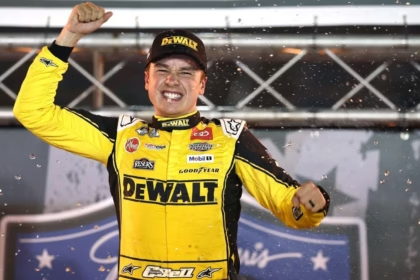The Legal Battle Between NASCAR and Two Teams: Explosive Revelations in Hearing
CHARLOTTE, N.C. – The tense dispute between NASCAR and two of its teams, which have filed a federal antitrust lawsuit, has reached a boiling point. A revealing hearing exposed emails and text messages with explicit language, coming from key figures such as team owner Michael Jordan and other prominent plaintiffs. In an exchange, Jordan, former NBA star and co-owner of the 23XI Racing Team, criticized Joe Gibbs Racing and the other 13 teams that signed the new NASCAR agreements last September.23XI Racing and Front Row Motorsports were the only teams that refused to sign extensions to the franchise agreements, similar to franchises in other sports. These teams sued NASCAR, accusing it of monopolistic practices. Both teams have warned that they could go bankrupt if the series sells its licenses. The documents revealed at the hearing exposed shocking details. NASCAR, owned by the France family, saw Jim France, current chairman, and Lesa France Kennedy, executive vice chairwoman, present in court. Steve Lauletta, president of 23XI, suggested that “Jim’s death would probably be the solution” to obtain better terms in the franchise agreements. Denny Hamlin, JGR driver, expressed his deep “disgust for the France family”. In another conversation, Jordan and Polk discussed the price of the licenses. Jordan stated that he would not sell, even if they were for sale. Polk responded that this was “just a hobby.” Jordan replied that you can only play golf to a certain point.“Teams will regret not joining us,” Jordan wrote in a text message to Curtis Polk, his business manager and partner at 23XI Racing.
Michael Jordan
In a second exchange, Jordan spoke with Polk about the cost of hiring a pilot, whose name was redacted. “I’ve lost it at a casino. Let’s do it,” Jordan replied.
NASCAR also had its own email exchange with explicit language among its top executives. Commissioner Steve Phelps wrote that the negotiations had not been productive and that an initial franchise proposal offered “zero wins for the teams”. Steve O’Donnell, president of NASCAR, also did not approve an initial version which, in his opinion, represented a step back to the terms of 1996. Jeffrey Kessler, the lawyer for 23XI and Front Row, argued that NASCAR’s exchanges, along with contingency plans to avoid competition, demonstrate that NASCAR is monopolizing the auto racing market. NASCAR has maintained in its legal filings that 23XI and Front Row forfeited their rights to six combined charters by refusing to sign the extensions last September. The teams began the season recognized as franchises, which guarantees entry for 36 teams in the race each week. Franchised teams also receive a substantially larger percentage of the payments. The order that recognized the six cars as franchised has been revoked and they currently compete as “open” teams. 23XI Racing driver Tyler Reddick has a clause in his contract that allows him to leave if his car is not franchised. Kessler indicated that Reddick and the sponsors have notified that 23XI is in breach of contract. Federal district judge Kenneth Bell warned during the hearing that NASCAR’s franchise system is at stake, depending on the outcome of the case. Arguments before Bell focused on the teams’ urgent request to restore their franchised status before the trial scheduled for December 1. NASCAR has indicated that it plans to begin selling the licenses immediately. Bell asked NASCAR’s attorney why the series couldn’t sell one of the four open spots and then address the issue once the case is resolved. NASCAR has maintained that it cannot be forced to do business with teams it doesn’t want to work with. The judge said he would rule on the request next week after the first playoff race of the season. Reddick and Bubba Wallace are in the playoff field for 23IX, and so is Hamlin, who races for JGR. Outside of court, Jordan stated that he has been open to a settlement, but is willing to take the case to trial. Kessler warned that if 23XI and Front Row do not recover their licenses, they will go bankrupt in 2026.“I’ve been a fan of the game for a long time,” Jordan said. “When we started this process, I always said that I want to fight for the betterment of the sport. Although they tried to point out that we’ve made some money, we’ve had a successful business. That’s not the point. The point is that the sport itself needs to change continuously for the fans and for the teams. I feel that we made a good statement about it today and I hope to go all the way. If I have to fight to the end, for the betterment of the sport, I will”.
Michael Jordan










